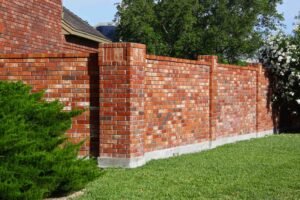Did you notice a crack in your brick wall? At this point, you’re left with the question, “Should I repair it or go for a complete replacement?” It’s a tough call. A small crack may seem harmless today, but if left unchecked, it could lead to bigger (and costlier) problems in the future. On the other hand, why replace a whole section when a quick repair would be enough? That’s just wasting money.
Phone: (251) 283-5661
Email: contact@mobilemasonryal.com
Cost Comparison: Repair vs. Replacement
Let’s break down the costs of each option to help you better understand the costs of repairs vs. a complete replacement. Remember that costs will vary depending on the contractor, location, and project size.
- Brick repair costs:
- Minor repairs: $300–$1,000
- Moderate repairs (replacing several bricks or repointing mortar): $1,000–$3,000
- Sealing and waterproofing: $500–$1,500
- Minor repairs: $300–$1,000
- Brick replacement costs:
- Small section replacement: $2,500–$5,000
- Full wall replacement: $5,000–$15,000+ (depending on the size of the wall and complexity)
- Small section replacement: $2,500–$5,000
As you can see, repairs are less expensive initially. However, if the damage is severe or if you’re facing frequent repairs, the cost of a replacement may be justified in the long run.

When Is Brick Repair the Better Option?
Often, minor damage can be repaired without a complete replacement. Skilled masons can restore structural integrity at a much lower price. Here’s when repair makes sense:
1. Minor Cracks or Chips
Small chips or hairline cracks do not always indicate that the structure as a whole is compromised. Without rebuilding the entire sections, a professional can replace individual bricks or use mortar to fill in cracks.
2. Loose or Crumbling Mortar
Over time, mortar joints weaken due to weather exposure. Repointing (replacing old mortar) is a cost-effective fix that strengthens walls without replacing bricks.
3. Surface-Level Damage
Bricks that are slightly worn or discolored may look better after cleaning and sealing. Often, older brickwork can be restored with pressure washing and specific treatments.
4. Cost Savings
Repairs are generally 30-50% cheaper than full replacements. For homeowners on a budget, fixing small issues early prevents bigger expenses later.
When Is Brick Replacement Necessary?
Sometimes, repairs aren’t enough. Severe damage can compromise safety and require complete replacement. Here’s when it’s the better choice:
1. Major Structural Damage
Large cracks, bulging walls, or shifting bricks indicate major problems. If the foundation is unstable, partial or full replacement may be the only safe solution.
2. Extensive Water Damage
Moisture can damage bricks from within, causing internal decay. If bricks are soft or crumbling, they might need to be replaced for long-term durability.
3. Outdated or Failing Masonry
Older homes may have bricks that no longer meet modern standards. Replacing them improves energy efficiency and prevents future repairs.
4. Matching Aesthetic Needs
If damaged bricks are discontinued or don’t match the existing structure, replacement ensures a uniform look.
Which Option Is More Cost-Effective?
For minor issues, repair is the best option. It is faster, cheaper, and preserves original brickwork. However, severe damage often requires replacement to avoid safety risks and higher future costs.
It is best to consult a trusted local masonry contractor for a thorough inspection. Early intervention can prevent costly rebuilds later.
Why Trust a Local Masonry Contractor?
Working with a local company offers peace of mind. Here’s why homeowners in Mobile, AL, choose Mobile Masonry Contractor:
- They know the local building codes and climate conditions.
- Their team has hands-on experience with homes just like yours.
- They’ll never upsell you—only offer the fix that makes the most sense.
Get A Free Quote Today!
📞 Call: (251) 283-5661
📧 Email: contact@mobilemasonryal.com
Frequently Asked Question(s)
Most sealers last 5–10 years. But in Mobile, due to heavy rain and moisture, it’s smart to have your bricks checked every 3–5 years.
Technically, yes. But it is easy to miss spots or use the wrong product. Hiring a professional ensures your bricks get full coverage and long-term results.
Spray a little water on the brick. If it beads up, it is sealed. If it soaks in and darkens the surface, it’s likely unsealed or needs resealing.
Most pros recommend waiting at least 30 days after construction to allow the bricks and mortar to fully cure. After that, sealing helps protect your new investment from day one.



